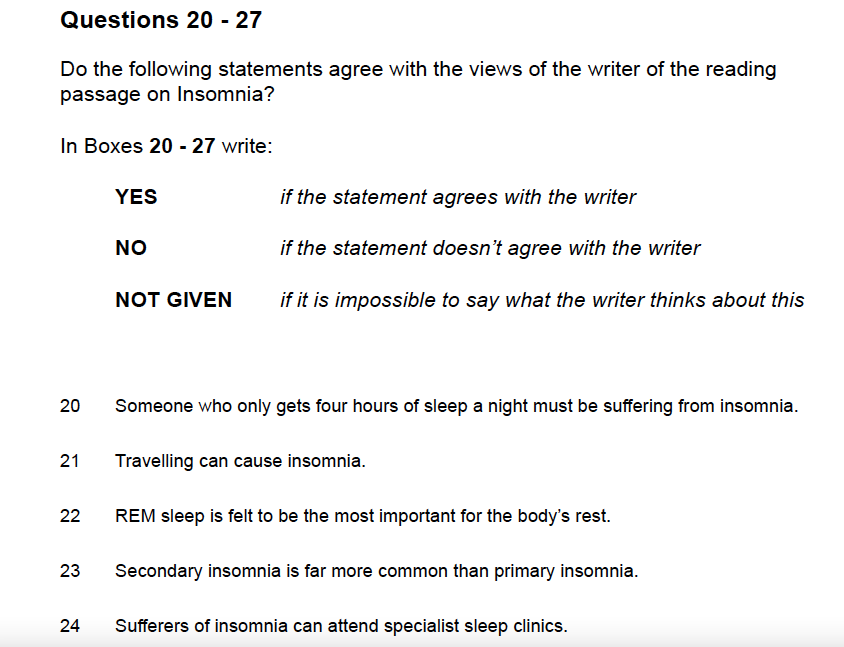IELTS Tips: True, False, or Not Given
Did you know MOSAIC Engage offers IELTS Prep classes? Click here to learn more!
Today’s topic is a reading question that many IELTS students fear: the dreaded “True, False, or Not Given” question.
This style of question can be particularly challenging for test-takers, but you are nearly guaranteed to encounter it once or twice on your test. So, let’s dive into some practical tips for dealing with these questions so you can be more confident and prepared on your reading test.
We will use some examples from a real IELTS reading test today. The questions are here on this page, and the full reading can be accessed here.
T/F/NG vs. Y/N/NG
If you have done an IELTS practice test before, you may have noticed that there are two versions of this question: one asking true or false, and the other asking yes or no. While the process for answering these questions is the same, be aware of the difference between them.
The major difference is that True/False/Not Given questions are asking us about facts stated in the reading. On the other hand, Yes/No/Not Given questions are asking us about the writer’s stated opinion. This will determine the type of information you are looking for, so be cautious.
When it comes to your answer sheet, both “Y” and “YES” are acceptable. However, if the question is T/F/NG and you answer “YES” instead of “TRUE,” it will be marked as incorrect. Always double check your answers.
Read all of the questions first
It’s a good idea to read the whole section of questions before you start so that you know what information you need to search for. You could also circle, highlight, or make a note about any key words that seem important to the question. These are the words you want to keep in mind as you read.
Skim and scan
The first step in answering any reading question is to skim and scan. Check out our blog post about it here.
For T/F/NG questions, starting with a question that contains a proper noun is a good idea because they can be scanned for more easily. For example, question 22 above contains the term “REM sleep.” A quick look at the reading shows us that paragraph C contains this term several times, so the answer should be in paragraph C.
For question 22, the answer is NO because the reading states that it is “non-REM” sleep which is “restorative” and “important in chronically painful conditions”
Look for paraphrasing
In the section above, we recommend look for questions with proper nouns like “REM sleep” first because they will appear in the same form in the reading. However, other nouns, adjective, and verbs will normally be paraphrased in the text. This means you need to have a large enough vocabulary to recognize the words. Check out our blog posts about paraphrasing here and here.
Question 21 above states that “Travelling can cause insomnia.” Searching for the word insomnia won’t help us because the whole article is about insomnia and the word appears dozens of times. Searching for the word travelling, is the right way to find that answer, but unfortunately this word doesn’t appear in the text at all. You will need to search for a synonym such as going on a trip, taking a flight, or going abroad.
For question 21, the answer is YES. In paragraph B you will notice that a sentence tells us “jet lag” can cause insomnia. Jet lag the fatigue you experience when travelling between time zones, so this is a synonym for “travelling.”
If you really can’t find it, it’s probably Not Given
If you’ve searched and searched but you can’t find the answer to a T/F/NG or Y/N/NG question, the answer is most likely Not Given. Since the test has a strict time limit, choosing NG is a safe option to keep yourself on track. If you have time at the end you can go back and double check.
For question 23 the answer is NOT GIVEN. The question says that “Secondary insomnia is far more common than primary insomnia.” Scanning for words like primary and secondary leads us to paragraph D where both types of insomnia are explained. They mention “common causes,” however, there is no comparison of how common these types of insomnia are.
————————
That’s all for today’s IELTS Success blog post. Why not click the link and try the whole insomnia reading for yourself. Remember to apply the tips you learned and keep reading our other posts for more strategies for success. Good luck in your studies and thanks for reading.
Do you need help preparing for IELTS? Join our test prep program at MOSAIC engage. We have in-person evening classes, three nights a week at our Commercial-Broadway location. Click here for more info!
We are also an IELTS test centre operator with locations across Vancouver. Check out our convenient locations on our IELTS test page.


